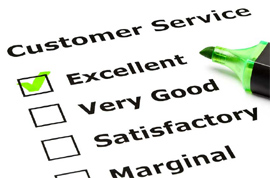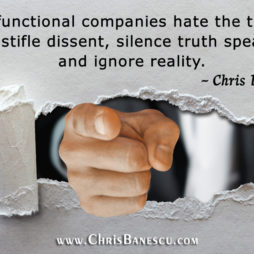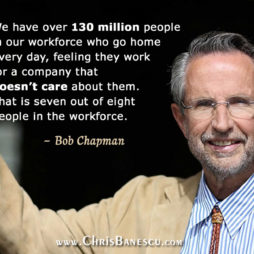 by Don Peppers –
by Don Peppers –
You’ve probably heard the joke: Two hunters confront a large grizzly bear. Their weapons misfire and the bear comes at them. The first hunter takes off running, but the second one pauses briefly to discard his hunting boots and put on running shoes. “Don’t waste so much time!” the first hunter yells over his shoulder, “Running shoes aren’t going to be enough to outrun that bear!” The second hunter, quickly catching up with his friend, replies “I don’t need to outrun the bear. I just need to outrun you!”
So now the question is: Do you have the right shoes to outrun your competitors? You might want to consider how well your customers trust you to act in their interest.
In tough times, buyers want to economize every bit as much as sellers do, so customers cut back, simplify, and search for reliability. Discount stores benefit as consumers look for bargains, but customer-oriented sellers also benefit, as customers seek out businesses they can trust. USAA, for example, has a well-earned reputation for being trustworthy. An insurance firm catering to current and former military personnel and their families, USAA ranked first–by a considerable margin–in a recent study by Forrester in what the research firm called “customer advocacy,” or “the perception by customers that a firm does what’s best for them, not just what’s best for its own bottom line.”
USAA is so dedicated to acting in its customers’ interests that immediately following the first Gulf War, it sent out unsolicited refunds for auto insurance premiums to some of its customers who had been away on overseas duty, and had obviously not been driving their cars during this period. More than 2500 of these customers mailed their refunds back to the company, many of them including notes of thanks and suggesting that the money would be put to better use keeping USAA financially sound.
Respecting your customers’ interests requires a good dose of customer insight, because you can’t understand what the customer’s interest is unless you can appreciate the customer’s own point of view. And in a downturn, customer insight not only helps a company earn the trust of its customers, but it also provides a platform for economizing and cutting costs in its own operations.
Think about it. Even in the worst economy imaginable–even if unemployment were 20% instead of just 9%–there would still be some customers happy to buy your product. If you have the tools and systems to know which customers those are–if you have the right customer insight–you can almost certainly outrun your competitors. Customer insight is always helpful, but in a recession it can make the difference between success and failure. Retaining good customers is simply a more cost-efficient way to compete in a more cost-sensitive environment.
So when the economy tanks, rather than simply assuming the fetal position and hoping for the best, take some time out first to bolster your customer-oriented services and do a better job of earning your customers’ trust. Here are four places to start:
- Identify the most valuable 20% or 30% of your customers and reach out to them with unsolicited benefits and personalized offers. Consider prioritized service, facilitated deliveries, customized invoicing cycles, more helpful information, and so forth.
- If you have to cut costs, then economize first by reducing or better automating the service provided to low-value customers.
- Strengthen your customer interaction processes. Reinforce your phone and email communications resources and set up better listening posts in social media as well. Create priority channels for your best customers to reach you.
- And when you look for ways to streamline your business and run more efficiently, think about focusing on the particular types of customers whose needs you meet best.
These are the kinds of strategies that work in a downturn. The CIO at a mid-sized food services company, for example, told my firm that during the last downturn they stopped “beating the bushes for new customers” and concentrated instead on retaining their best customers. The result was that many of those accounts grew in volume and became more profitable in the middle of the recession, as customers consolidated their own spending with the supplier they trusted the most. And one specialty chemical maker’s director of finance told us that prior to the last downturn the company had identified its top 20% of customers by profitability. During the downturn they were able to focus on these customers, “looking for ways to improve product sales and services, reduce costs, and strengthen relationships.” Because they had taken these actions, the finance director said, while the downturn hurt company sales, profitability didn’t suffer nearly as much.
Economic cycles are inevitable. You can blame the Tea Party or the Orator in Chief, hedge fund plutocrats or the ratings agencies, but the simple fact is that downs are as inevitable as ups are, and it doesn’t take anyone to “cause” them. The right economic policies may help soften the blow of a downturn, but simulation studies have shown that any competitive economic system will oscillate, even with no outside perturbation at all. It’s just what economies do.
So whether the US economy heads into recession again this year or not, your business would be wise to keep a good pair of customer-trust running shoes handy.
Depardieu has been looking for a new home after telling France’s newly elected socialist prime minister that he would surrender his passport and French social security card in protest of the tax.
Moscow hopes its lower tax rate will attract a “massive migration of rich Europeans to Russia.” Russia already ranks seventh in millionaires worth more than $30 million. And Deloitte expects the number of Russian millionaires to triple to 1.2 million by 2020. (America, by comparison, has 5.2 million millionaires.)
Take note, Mr. President: Russia’s flat-tax miracle has helped bring its budget back into balance. Its revenues from income taxes have more than doubled since the single, low tax rate was instated.
Communist China, which now runs a socialist market economy, also welcomes millionaires. And it’s been creating record numbers of them since reducing its tax burden. There are now 1.1 million millionaires in China — a national record — and 63,500 multimillionaires and billionaires.
Since abolishing its agriculture tax and slashing its tax on small businesses by 50%, China has enjoyed the world’s biggest gains in the number of rich (though granted, coming off a low base). The vast majority of millionaires in China are business owners, who are taking advantage of the government’s recent market reforms and pro-business tax incentives.
As part of its post-crisis economic stimulus package, Beijing is reforming its VAT tax, which would cut corporate taxes as well. And just two months ago, it launched a new round of tax-cutting measures that will help more than 900,000 companies throughout China.
Meanwhile, back in formerly supercapitalistic America, our leaders have agreed to jack up taxes on small businesses. Obama’s new fiscal-cliff tax hike on individual filers earning $400,000 or more in income will hit more than 750,000 small-business owners. They account for more than 56% of all income from such firms and employ tens of millions of workers, both of which will be hurt by the higher rate.
Yet Obama says “there is still more to do” to make sure “the wealthiest Americans pay their fair share.” He vows to make “our tax code more progressive than it’s been in decades.”
Funny how the Russians and Chinese figured out that class-warfare ideology doesn’t work and is in fact, a recipe for failure. Funny how communists know that lower taxes grow the economy and keep you competitive.
As our president mau-maus the rich to “pay their fair share” to help fund his massive social programs, America, like Europe, risks losing a fair share of its wealth and power to communist superpowers that have rethought and reformed their command-and-control economies.
Obama thinks he’s taking the nation “Forward!” But he’s really taking it back to the failed past.
HT: FastCompany



